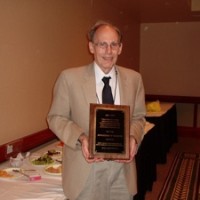
2007 Career Contribution Award: Sam Friedman
Out of an excellent field of candidates, the committee was delighted to give the first ever Award for Career Contributions to the Sociology of HIV/AIDS to Sam Friedman.
Sam earned his PhD at the University of Michigan, and is now a Senior Research Fellow and the Director of the Social Theory Core in the Center for Drug Use and HIV Research at National Development and Research Institutes here in New York City. In addition, he was recently appointed as a Senior Associate in the Department of Epidemiology of Bloomberg School of Public Health, at Johns Hopkins University. Sam has devoted his professional life for the last two decades to exemplary research and community politics related to HIV/AIDS. His particular focus has been on epidemiology and prevention for injection drug users, and his research has gone a long way toward improving prevention strategies and reducing HIV transmission for this group. He has published over 300 articles, paying particular attention to sexual and social networks, social and structural interventions, and collective organization and activities of drug users. As a nationally and internationally recognized leader in the field, he has been an editor at major AIDS-related journals and has worked on key panels for the National Academy of Sciences and for International AIDS Conferences.
It addition to these abundant academic accomplishments, it would also be difficult to recognize someone who has been more important to SAN over the years. Noting the need for an academic community in which AIDS-related work could be nurtured and valued in the late 1980s, Sam co-founded the Sociologists AIDS Network with Martin Levine, after whom SAN’s paper award is named. As a sometimes-chair and consistent leader ever since, Sam has worked hard to keep HIV/AIDS issues and SAN itself on the ASA meeting agenda. Because of his initiative and the devotion of those who followed, SAN has been here for 20 years to support those of us who value AIDS work in sociology, whether or not we work in traditional sociological settings.
 01. Aug, 2007
01. Aug, 2007 







Comments are closed.